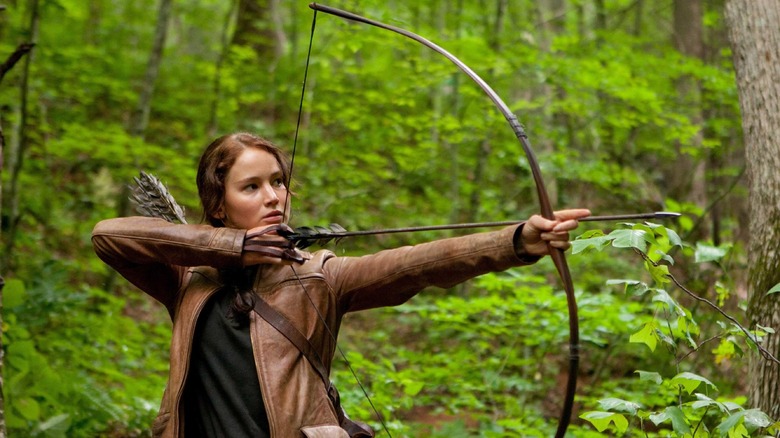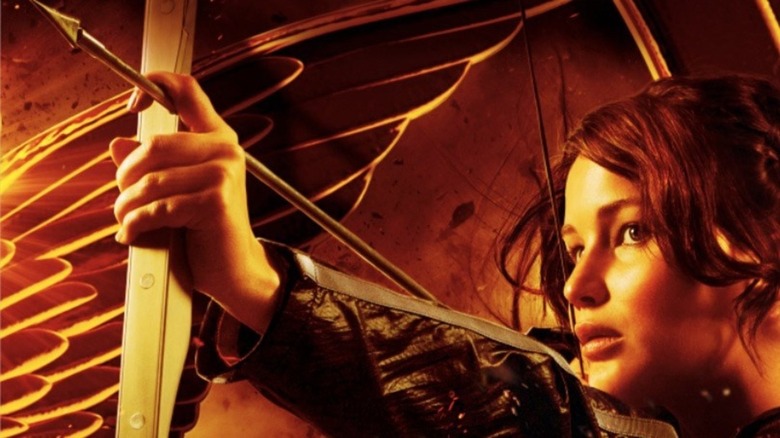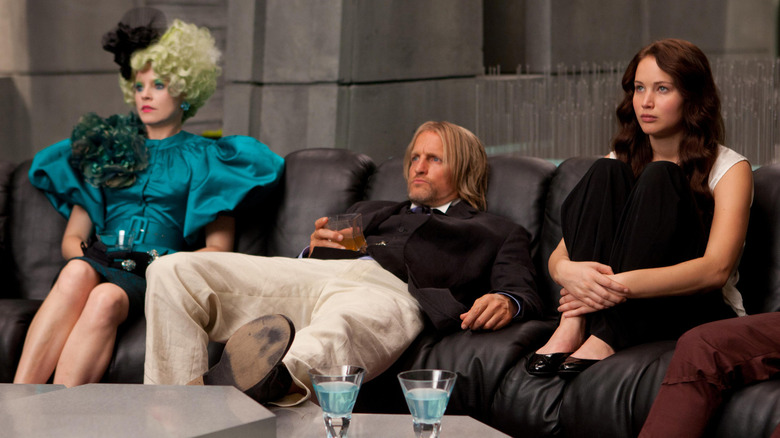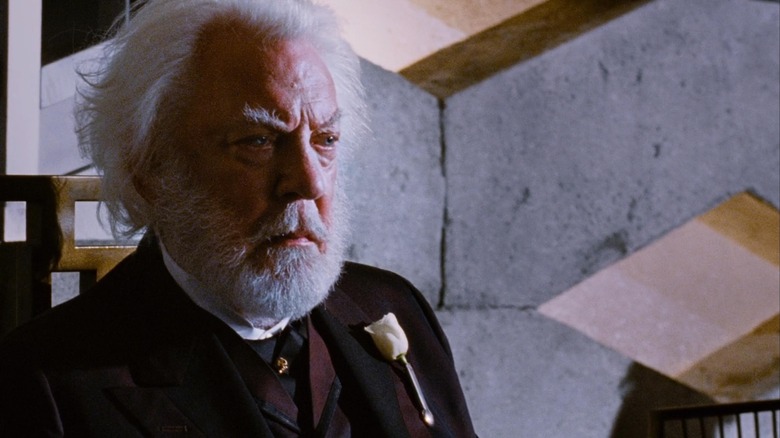Tales From The Box Office: The Hunger Games Legacy 10 Years Later
There was a relatively specific moment in time for Hollywood when the YA craze took over and every studio was looking for a young adult franchise to rule them all. There was "Harry Potter." There was "Twilight." And it was Lionsgate winning the rights to a novel titled "The Hunger Games" in 2009 that was the true turning point. At the time, the book, written by Suzanne Collins, was a hit, but not a gigantic hit. However, by the time Jennifer Lawrence was cast to lead the movie, more than 10 million copies had flown off the shelf, making Lionsgate look brilliant at a time when they needed it most. In the end, they ended up creating the YA franchise to rule all other YA franchises.
Today, we're looking back at "The Hunger Games" in honor of the first movie's 10th anniversary. We're going to go over how the movie came to be, all of the imitations that followed, why it might have had some negative consequences for Lionsgate, and what lessons can be learned from the success of the franchise. Let's dig in.
The movie: The Hunger Games
Lionsgate was struggling a bit to build an identity as a studio back in 2009. While they had been behind hits such as "Saw" and some of Tyler Perry's films, the studio had not turned a profit in years. To get into a bigger game, the studio aggressively pursued the rights to "The Hunger Games" after the book became a hit. The studio managed to win over Collins by letting her truly be a part of the process while staying true to her novel — Collins actually wrote the screenplay with director Gary Ross. The juice was worth the squeeze, as then-CEO of Lionsgate Jon Feltheimer said back in 2009.
"The Hunger Games gives us the rare opportunity to take an exciting brand with a built-in frequent filmgoing audience and construct it from the ground up into a potential franchise."
It cannot be emphasized enough that when Lionsgate paid $200,000 for the rights to those books, there was no guarantee of franchise potential. This was, in some ways, a gamble, especially from a studio that didn't have hundreds of millions of dollars to play with. To cobble together the $88 million budget, the studio had to take money away from other already low-budget projects to make it work, all while fighting off mounting financial pressures after suffering five years of losses in a row. Yet, Feltheimer's optimistic outlook proved right and this was indeed going to be the start of a big new franchise — one that would inspire several copycats in the years to come.
But the individual pieces did not scream "success." Ross had only directed "Pleasantville" and "Seabiscuit" prior. He did not seem like the big-budget franchise guy. Lawrence was a rising star but this was before she became a full-blown A-lister, which would largely be cemented following this movie's release. A cast of respected actors such as Elizabeth Banks, Woody Harrelson, Stanley Tucci, and Donald Sutherland, amongst others, was of great benefit, but none of them were going to guarantee any sort of success. This was truly about trusting the process and trusting that big bet until the very end, for better or for worse. Fortunately, it worked out about as good as anyone could have possibly hoped.
The financial journey
"The Hunger Games" hit theaters on March 23, 2012, and absolutely blew the lid off of expectations with a gigantic $152.5 million opening weekend. The fact that it nearly doubled its budget in a matter of days was such a huge win for Lionsgate it's downright remarkable. The movie finished its run with a very domestic-heavy $678 million global haul, setting up a series of sequels that would be released through 2015. All told, the four-film series earned $2.95 billion, peaking with the first sequel, "The Hunger Games: Catching Fire," which netted $864 million, though its budget ballooned to $130 million. In any event, this was the big-budget franchise that helped cement Lionsgate as a major player.
To the surprise of nobody, Hollywood responded by trying to imitate this success by snatching up the rights to other YA books and turning them into movies. 20th Century Fox acted fast by getting "The Maze Runner" in theaters in 2014, becoming a decent hit at $348 million globally against a $34 million budget. The trilogy, in total, earned $924 million against combined budgets of $156 million. Any studio in town would take that bet, but it still pales in comparison to what "The Hunger Games" managed. And this was one of the best-case scenario imitators out there.
One of the most disastrous examples is, oddly enough, also from Lionsgate in the form of the "Divergent" series which also kicked off in 2014 promisingly enough with "Divergent," an $85 million budgeted flick that earned $276 million. Unfortunately, by the time "Allegiant" rolled out in 2016, things cooled off significantly with the $110 million budgeted threequel taking in just $172 million. Ouch. The studio ultimately tried to wrap things up with a TV movie, "Ascendant," that never came to pass in no small part because franchise star Shailene Woodley had no interest in doing such a thing. An utter disaster.
Other notable YA flameouts in the years that followed include but are not limited to "The 5th Wave," "Mortal Instruments," "The Darkest Minds," and most recently (again from Lionsgate!) the disastrous "Chaos Walking." Many tried. Most failed. Some succeeded modestly, but none captured that same level of pop culture awareness that the tale of Katniss Everdeen managed to.
The lessons contained within
It's amazing how much I have to keep going back to this as I look back at the successes and failures of Hollywood in this column, but chasing the dragon is a fool's errand. If something clicks, the notion of trying to replicate a very specific model of success that boils down to a very difficult to capture flash in the pan is at best difficult and at worst calamitous. Don't take the wrong lessons away from a thing. Just because one dystopian YA survival franchise worked doesn't mean every copycat stands a chance. Studios would do well to look at the nuance of success, rather than focus on the specificity of success.
But in reflecting on this ten years later, it's best to focus very specifically on Lionsgate. The studio is one of few mini-majors left in town. Not quite as big as Disney or Warner Bros. but still able to compete, this studio is wildly important right now as movie theaters are hoping to stay afloat and every major studio doubling down on streaming. The problem is, the success of "The Hunger Games" gave Lionsgate a taste of big-budget success and they've been chasing that dragon ever since, often with ugly results.
Aside from the ones we've already discussed, "Power Rangers," "Robin Hood," "Midway," and most recently "Moonfall" are just some of the blockbuster failures they've suffered over the last decade, with "Moonfall" ranking as perhaps one of the biggest bombs in history. In one way, "The Hunger Games" saved the studio and made everyone pay attention, but the consequence of that success is that it has led to a series of flops that cost the studio a great deal of money. Chasing that success has been a recipe for failure ever since.
Meanwhile, Lionsgate is one of the only studios in town managing to consistently do well with mid-budget films, with "John Wick" and "Knives Out" serving as recent examples. As I've argued in the past, Lionsgate would do well to stop chasing the ghost of "The Hunger Games" and focus on filling a much-needed hole in the modern Hollywood landscape. So go ahead, make that "Hunger Games" prequel, because there is almost definitely a lot of money to be made there. But don't double down on pie-in-the-sky thinking that leads to big losses. Do what you do best. Be that reliable mid-budget hit factory and the odds will forever be in their favor.



